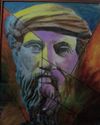
The reason for this was the publication of her thesis, Speculum of the Other Woman (1974), a radical critique of the use of the feminine in psychoanalysis, and a deconstruction of the very foundations of our culture. According to Irigaray, our culture is built around the idea of a 'neutral subject'; but this idea is fictitious: the reality is what she calls 'sexuate belonging' and 'sexuate difference'. This says there are two subjectivities, masculine and feminine, and also a culture of 'between two'; as opposed to the idea of a universal human subject who in practice is male.
The immediate scandal of the publication was commensurate with the book's success: Irigaray was cast away from Vincennes University and the École Freudienne de Paris. Later she was prevented from publishing anything. Already exiled from her birth country, Belgium, and from her coal-miner family, the young woman faced intellectual rejection in her new homeland. She and her ideas took refuge abroad; in Italy where she worked alongside the Communist party for years; and in the United States, where she became a fundamental reference for gender studies and feminist theory. Her deep ecological conviction was born out of 'a respect for nature', which is also at the heart of her differentialist approach to gender. Reluctant to look back on the controversies she's had to face, she tirelessly endeavours to 'create something positive for the present and the future' instead of dwelling on negatives.
Her latest work, The Mediation of Touch, explores the role of touch as living mediation in relating to oneself, to the other(s) and to the world. It develops the idea that touch entails communing with other living beings rather than seizing hold of them as quasi-objects; and suggests that touch can ensure a sensitive mediation between individuals in a culture of transcendental difference(s).
Diese Geschichte stammt aus der June/July 2024-Ausgabe von Philosophy Now.
Starten Sie Ihre 7-tägige kostenlose Testversion von Magzter GOLD, um auf Tausende kuratierte Premium-Storys sowie über 8.000 Zeitschriften und Zeitungen zuzugreifen.
Bereits Abonnent ? Anmelden
Diese Geschichte stammt aus der June/July 2024-Ausgabe von Philosophy Now.
Starten Sie Ihre 7-tägige kostenlose Testversion von Magzter GOLD, um auf Tausende kuratierte Premium-Storys sowie über 8.000 Zeitschriften und Zeitungen zuzugreifen.
Bereits Abonnent? Anmelden

FALLING DOWN
Thomas R. Morgan considers how personal identity is maintained, and how it is lost.

Pythagoras (570-495 BCE)
Daniel Toré looks beyond the mathematician to the philosopher.

Wordsworth & Darwin
Christine Avery wonders whether poetry can help us to deal with science.

Plants & Philosophy
Caroline Deforche sees similarities between gardening and philosophising.

Dr.Gindi sculptor, has a philosophical conversation with Richard Baron about sensation, life, infinity and, you guessed it, sculpture.
Dr. Gindi is one of Switzerland's foremost sculptors, whose work has been exhibited in many countries.

Thomas Aquinas on Extraterrestrial Life
Babatunde Onabajo tells us why Aquinas did not believe in aliens.

The Fire This Time
Tim Madigan on Ray Bradbury, Bertrand Russell and Fahrenheit 451.

Trust, Truth & Political Conversations
Adrian Brockless wants a recognition of human value in political debate.

Philosophy & The Crown
Vincent Di Norcia on monarchy and stability.

Technologists & Ethicists
Stephen L. Anderson laments inadequate moral insight among tech leaders.